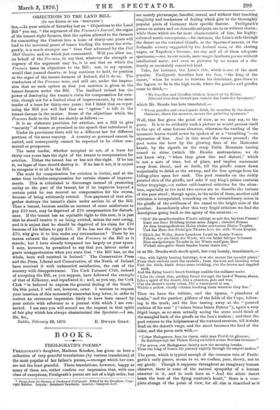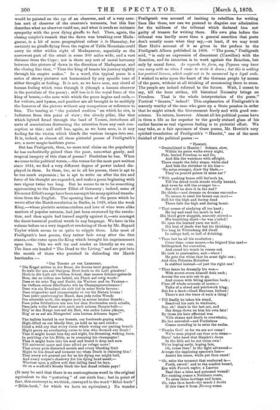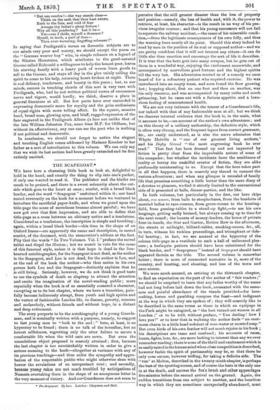BOOKS.
FREILIGRATH'S POEMS.*
FREILIGRATH'S daughter, Madame Kroeker, has given us here a collection of very graceful translations (by various translators) of the most popular of her father's poetne,—amongst which her own are not the least graceful. These translations, however, happy as many of them are, rather confirm our impression that, with one class of exceptions, Freiligrath's poems are not of a high order, but * Poems from the German of Ferdinand Freiligrath. Edited by his Daughter. Copy- right Edition. Leipzig : Bernhard Tauchnitz. London : Sampson Low. plete change of the point of view, for all else is described as it
are merely picturesque, fanciful, unreal, and without that touching simplicity and tenderness of feeling which give to the thoroughly popular poets of Germany their specific flavour. Freiligrath's poems on nature and on domestic subjects are to us without charm ; while those which are far more characteristic of him, his highly.
coloured scenic conceptions,—for instance, the Lion's ride through the desert on the tortured Giraffe, or the Spectre-Caravan, or the Icelandic scenery suggested by the Iceland moss, or the skating negro, or Napoleon's bivouac, are any and all of them adequate specimens,—are, to our minds, mere magic-lanthorn poems without intellectual unity, and even as pictures by no means of a dis- tinctly or accurately conceived kind.
Take, for instance, the Lion's ride, which is one of the most popular. Freiligrath describes how the lion, "the king of the desert," when he wishes to traverse his dominions, goes down to the lagoon to lie in the high reeds, where the gazelles and giraffes come to drink,—
" We Gazellen und Giraffen trinken, kauert or ha Rohre, Zitternd iiber dem Gewalegen rauscht dna Laub der Sycomore," which Mr. Brooke has here translated,— " Where gazelles and camelopards drink, he crouches by the shore; Ominous, above the monster, moans the quivering sycamore."
Well, that line gives the point of view, as we may say, to the poem. It is to be evidently such a picture as would present itself to the eye of some human observer, otherwise the rustling of the sycamore leaves would never be spoken of as a "trembling "—an expression of fear. And in this mood the verses proceed ; the poet notes the hour by the glowing fires of the Hottentot kraals, by the signals on the steep Table Mountain having ceased to shine (which Mr. Brooke mistranslates, we do not know why, "when they grow dim and distant," which is not a note of time, but of place, and implies movement away from them), and so forth, till the giraffe comes down majestically to drink at the swamp, and the lion springs from his hiding-place upon her neck. The poet remarks on the richly painted skin of the giraffe, and asks if any king's palace contains richer trappings,—a rather cold-hearted criticism for the situa- tion, especially as the next two verses are to describe the torture of the poor steed ; though again, in the midst of these, another cold criticism is interpolated, remarking on the extraordinary union in the giraffe of the swiftness of the camel to the bright skin of the panther. Immediately after this very frigid criticism we find the description going back to the agony of the creature :—
" Sieh' die mondbestrahlte Flitche schligt es mit den leichten Fassen! Starr aus ihrer Elohlung treten seine Augen ; rieselnd flieasen An dem braungefleakten Hulse nieder schwarzen Blutes Tropfen, Und das Herz des ilticht'gen Thieres hart die stifle Waste klopf en.
" Gleich der Wolke, deren Leuchten Israel im Lande Yemen Farts, wie em n Geist der Waste, wie sin fabler luft'ger Schemen Eine sandgeformte Trouibe in der Whale sand'gem Meer Wirbelt sine gelbe Sauk) Sandes hinter ihnen her,"
or as Mr. Brooke with much spirit, but very loosely, translates it,— " See, with lightly beating footsteps, how she scours the moonlit plains! From their sockets start the eyeballs ; from the torn and bleeding veins Fast the thick, black drops come trickling, o'er the brown and dappled neck,
And the flying beast's heart-beatings audible the stillness make. . "Like the cloud, that, guiding Israel through the land of Yemen, ehone, Like a spirit of the desert, like a phantom, pale and wan, O'er the desert's sandy ocean, like a waterspout at sea,
Whirls a yellow, cloudy column, tracking them where'er they flee."
Then we have the vulture, and the hymna, "plunderer of tombs," and the panther, pilferer of the folds of the Cape, follow- ing in the track, and the lion tearing away at the "painted cushion of his seat" (" seines Sitzes bunts Polster "), again a very frigid image, as no man actually seeing the scene could think of the mangled back of the giraffe as the lion's cushion ; and then the poet returns to the helplessness of the tortured creature, till it sinks dead on the desert's verge, and the steed becomes the food of the rider, and the poem ends with,—
" Ueber Madagascar, fern im Osten, sieht man Frahlicht gliinzen;
So durchsprengt der Thiere Honig niichtlich seines Belches Grenzon."
"Far across, o'er Madagascar, faintly now the morning breaks ;
Thus the king of beasts his journey nightly through his empire makes."
The poem, which is typical enough of the common vein of Freili- garth's early pieces, seems to us, we confess, poor, showy, not to say gaudy. Though it supposes throughout an imaginary human observer, there is none of the natural sympathy of a human observer in it, and in such lines as "And the silent desert hears the beat of the flying creature's heart," there is a corn-
would be painted on the eye of an observer, and of a very care- less sort of observer of the creature's torments, but this line describes what no observer could see, and what it needs an intimate sympathy with the poor dying giraffe to feel. Then, again, the closing couplet's remark that the dawn was breaking over Mada- gascar, is a bit of mere geographical colour it la Macaulay, for certainly no giraffe flying from the region of Table Mountain could carry its rider within sight of Madagascar, especially as the narrowest part of the strait is some 300 miles wide, and a vast distance from the Cape ; nor is there any sort of moral harmony between this picture of dawn in the direction of Madagascar, and the closing line that, "Thus the king of beasts his journey nightly through his empire makes." In a word, this typical poem is a series of showy pictures not harmonized by any specific tone of either thought or feeling. It is not, as we have seen, any chord of human feeling which runs through it (though a human observer is the postulate of the poem) ; still less is it the royal force of the king of beasts,—the note with which the poem begins and ends,— for vulture, and hyasna, and panther are all brought in to multiply the features of the picture without any comparison or reference to him. The tearing at "the painted cushion" on which he sits, is ludicrous from this point of view ; the cloudy pillar, like that which lighted Israel through the land of Yemen, introduces all sorts of associations distracting the attention from any such con- ception as this ; and still less, again, as we have seen, is it any feeling for the victim which blends the various images into one. It is, indeed, as almost all these pictorial poems of Freiligrath's are, a mere magic-lanthorn poem.
But has Freiligrath, then, no more real claim on the popularity he has undoubtedly gained than the poor, somewhat gaudy, and tropical imagery of this class of poems ? Doubtless he has. When we come to his political verses,—the verses for the most part written since 1844, we find a very different degree of power indeed dis- played in them. In these, too, as in all his poems, there is apt to be too much expansion ; he is apt to write on after the fire and force of his thought are expended, and make a poem beginning with rare vigour twice too long. But he seems to us to be something approaching to the Ebenezer Elliot of Germany ; indeed, some of Ebenezer Elliot's songs have been amongst his many spirited transla- tions from the English. The opening lines of the poem which he wrote after the March revolution in Berlin, in 1848, when the weak King,—whose pietistic sentimentalism and love of wine were alike matters of popular sarcasm, had just been overawed by the revolu- tion, and then again had turned angrily against it,—are amongst the finest bursts of poetical wrath in any language. We have in the volume before us a very imperfect rendering of them by Mr. Bayard Taylor which seems to us quite to cripple them. Like most of Freiligrath's best poems, they rather fade away after the first stanza,—the curse upon the King which brought his imprisonment upon him. This we will try and render as literally as we can. The lines are headed "The Dead to the Living," and are put into the mouth of those who perished in defending the March barricades :— "DIE TODTEN AN DIE LEBENDEN.
"Die Kugel mitten in der Brust, die Sterne breit gaspalten So habt ihr uns auf blut'gem Brett hoch in die Luft gehalten! ,Hoch in die Luft mit wildem Schrei, dass unsere Schmerzgeberdo Dem, der zu todten tins befahl, em n Finch ant swig werde ! Dass er sie ache Tag und Nacht, im Wachen and im Traume- Im Oeffnen seines Bibelbuchs wie im Champagnerschaume Due wie em n Brandmal aie rich tief in seine Seale brenne Dass nirgendwo und nimmermehr or vor ihr fliehen kiinne ! Dass jeder qualverzog'ne Muud, dass jede rothe Wunde Ihn schrecke noch, ihn angate noch in seiner letzten Sttuade ; Dass jedes Schluchzen um uns her dem Sterbenden noch actuate, Dass jede todte Faust rich noch nach seinem Haupte balle- Meg' er das Haupt nun ant sin Bett, wie andre Lento pliegen, Meg' er es auf em n Blutgeriist' zum letzten Athmen legen!"
The bullets buried in our breasts, our foreheads gaping wide,
High-lifted on our bloody bier, ye held us up and cried— Cried a wild cry that every throe which wrung our parting breath
Might prove an everlasting curse to him who doomed our death ! That it might haunt him day and night, his dreaming, waking, bane, In pott'ring o'er his Bible, as in creaming his champagne !
That it might burn into his soul and brand it deep and sore Till universal space and time afford no refuge more !
That every pain-distorted mouth and every bleeding limb Might be his dread and torment too when Death is claiming him !
That every sob poured out for us his dying ear might hail,
And every corpse's shadowy fist his dying head assail,—
Whether upon a pillow soft that failing head he lays,
Or on a scaffold's bloody block the last dread tribute pays!
(It may be said that there is no contemptuous word in the original equivalent to the " pottering " of our sixth line ; but in point of fact, this contempt is, we think, conveyed in the word "Bibel-buch" "Bible-book," for which we have no equivalent.) No wonder
Freiligrath was accused of inciting to rebellion for writing lines like these, nor can we pretend to disguise our admiration for the mildness of the tribunal which declared him not guilty of treason for writing them. His own plea before the tribunal was hardly more than a general assertion that poets don't usually mean what they say,—at least, if we may trust Herr Hub's account of it as given in the preface to the Freiligrath Album published in 1868. "The poem," Freiligrath said, "is only an expression of discontent (Unwillen) with the Reaction, and its intention is to work against the Reaction, but only by moral force. ..4s regards its form, my Pegasus may have run away with me when I came to write it down ; but this is nothing but poetical licence, which ought not to be measured by a tegal code. I wished to seize upon the heart of the German people by means of the poem, without at all thinking of summoning them to arms. The people are indeed referred to the future. Wait, I meant to say, till the hour strikes, till historical Necessity brings on Freedom. That is the whole interpretation of the poem." Poetical "licence," indeed ! This explanation of Freiligrath's is scarcely worthy of the man who gave up a State pension in order that he might attack the Government freely and with good con- science. To return, however. Almost all his political poems have in them a life as far superior to the gaudy stained glass of his earlier fancies as real vigorous feeling is to pictorial effort. We may take, as a fair specimen of these poems, Mr. Howitt's very spirited translation of Freiligrath's "Hamlet," one of the most finished of the political poems :— " HAMLET.
"Deutschland is Hamlet ! Solemn, slow, Within its gates walks every night, Pale, buried Freedom to and fro, And fills the watchers with affright.
There stands the lofty shape, white-clad And bids the shrinker in his fear—
'Be mine avenger, draw thy blade,— They've poured poison in mine ear !'
"With quaking bones still list'neth he,
Till the dread truth stands wholly kenned, And vows he will the avenger be—
But will he dare it in the end?
He thinks—and dreams on dreams succeed— No means to steel his breast can start— Still for the high and daring deed There fails the high and daring heart.
"That comes of studying all too hard ; He lay and read too much in bed ;
His blood grew sluggish, scarcely stirred— His breathing short—he was o'erfed !
He span the learned yarn too well ; His best of deeds was but his thinking; Too long in Wittenburg did dwell In college hall, or hall of drinking.
"Thus lost he all his resolution ;
Come time, come means,—he feigned him mad—
Soliloquized, for execution, And eased his wrath in verses sad.
He took to pantomime, and—whew !
He gets the whim that he must fight one ; And then Polonius-Kotzebue Is stabbed instead—of just the right one!
"Thus bears he dreamily his woe— With secret acorn himself doth rack ; Across the sea sets out to go, And comes with biting speeches back ; Fires off whole arsenals of scorn— Talks of a shred and patchwork king; But for a deed—Good Heavens, forlorn ! There's not the trace of such a thing!
"Till finally he takes his stand, Resolved his oath to vindicate, But, ah! that's in the last act, and But drags down on him his own fate! By those his hate effectual was
With shame and death to overwhelm, He lies unsouled—and Fortinbras Comes sounding in to seize the realm.
"Thanks God! so far we are not come !
We've seen played out four acts alone—
Hero! take heed that Hamlet's doom In the fifth act be not thine own!
We're hoping early, hoping late,
Oh, rouse thee ! to the fight advanced— Avenge the imploring spectre's fate— Assert his cause, while yet thou canst!
"Oh, seize the moment that conferred is— Forth, sword ! and to the conflict bound, Ere with French rapier, a Laertes
Deal thee a false and poisoned wound!
Ere rushing comae a Northern route, To seize thine heritage and home,
Oh, take then heed—for much I doubt If this time it from Norway come. "But one resolve !—the way stands clear—
Think on the oath that thou haat sworn, Rush to the lists, and void of fear Avenge thy father's ghost forlorn ! Why all this pondering ? Let it be-
Yet—can I chide, myself a dreamer ? Myself, in troth, a part of thee—
Thou ever-wavering, lingefing schemer?"
In saying that Freiligrath's verses on domestic subjects are to our minds very poor and watery, we should except the poem on the "German weaver boy" who, in simple reliance on a legend of the Silesian Mountains, which attributes to the good-natured Gnome called Riibezahl a willingness to help the honest poor, leaves his starving family with a heavy pack of woven linen goods to sell to the Gnome, and stays all day in the glen vainly calling the spirit to come to his help, returning heart-broken at night. There is real delicacy, tenderness, and beauty in this poem ; but, to our minds, success in touching chords of this sort is very rare with Freiligrath, who, had he not written political verses of uncommon nerve and vigour, would hardly, we think, deserve a place in general literature at all. But few poets have ever succeeded in expressing democratic scorn for royalty and the grim enthusiasm of equal rights with more telling effect. In the square, massive head, broad nose, glowing eyes, and bluff, rugged expression of the face engraved in the Freiligrath Album (a face not unlike that of the late William Johnston Fox, some time M.P. for Oldham, but without its affectations), any one can see the poet who is nothing if not political and democratic.
In conclusion, we should not forget to notice the elegant and touching English verses addressed by Madame Kroeker to her father as a sort of introduction to this volume. We can only say that we wish its last section had been greatly extended and its first entirely omitted.




































 Previous page
Previous page